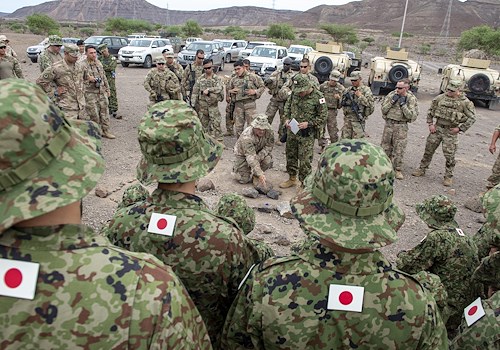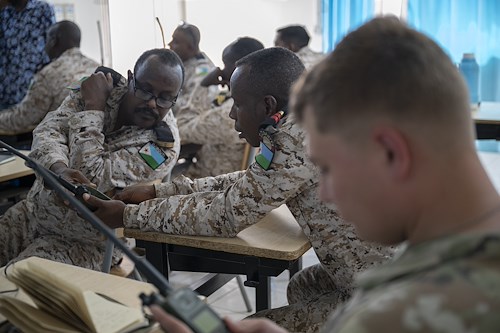Gallery contains 8 images
×
Photo 1 of 8
Japanese-led NEO enhances interoperability among coalition and African partner nations
U.S. Army 1st Lt. Nicholas Sereday, executive officer for Charlie Company 2-113th Infantry assigned to Combined Joint Task Force-Horn of Africa (CJTF-HOA), gives a concept of operations (CONOP) brief to Japanese and U.S. military forces during a bilateral field training exercise (FTX) in Djibouti, Africa, Oct. 2, 2019. The FTX was part of a Japanese-led noncombatant evacuation operation (NEO) exercise, which also included African coalition partners. (U.S. Air Force photo by Senior Airman Gabrielle Spalding)
Photo by: Senior Airman Gabrielle Spalding
Photo 2 of 8
Japanese-led NEO enhances interoperability among coalition and African partner nations
U.S. Navy Lt. Cmdr. Thomas Koehler, contingency branch chief assigned to Combined JointTask Force-Horn of Africa (CJTF-HOA), briefs U.S. noncombatant evacuation operation (NEO) rules of engagement during a Japanese-led NEO exercise in Djibouti, Africa, Oct. 1, 2019. A NEO is the military assisted departure of civilian noncombatants and nonessential military personnel. (U.S. Air Force photo by Senior Airman Gabrielle Spalding)
Photo by: Senior Airman Gabrielle Spalding
Photo 3 of 8
Japanese-led NEO enhances interoperability among coalition and African partner nations
U.S. Army Sgt. Alexander Campbell, joint reception center non-commissioned officer in charge (NCOIC), assigned to Combined Joint Task Force-Horn of Africa (CJTF-HOA), enters evacuees into the noncombatant tracking system (NTS) at Camp Lemonnier, Djibouti, Oct.3, 2019. This demonstration was part of a multi-day exercise with CJTF-HOA and Japanese military members in which multinational discussions, bilateral field training, and tabletop exercises were conducted. (U.S. Air Force photo by Senior Airman Gabrielle Spalding)
Photo by: Senior Airman Gabrielle Spalding
Photo 4 of 8
Japanese-led NEO enhances interoperability among coalition and African partner nations
A Japanese service member watches U.S. Army High Mobility Multipurpose Wheeled Vehicles (HMMWV) during a bilateral field training exercise in Djibouti, Africa, Oct. 2, 2019. The training was part of a multi-day exercise with Combined Joint Task Force-Horn of Africa (CJTF-HOA) and Japanese service members, during which multinational discussions, NEO tracking system demonstrations, and tabletop exercises were conducted. (U.S. Air Force photo by Senior Airman Gabrielle Spalding)
Photo by: Senior Airman Gabrielle Spalding
Photo 5 of 8
Japanese-led NEO enhances interoperability among coalition and African partner nations
U.S. Army soldiers assigned to Combined Joint Task Force-Horn of Africa (CJTF-HOA) listen to a Japanese service member go over operation plans during a bilateral field training exercise in Djibouti, Africa, Oct. 2, 2019. The field training exercise related to military response of a mock explosion of an improvised explosive device (IED) during a convoy operation, as well as a response to a complex attack. (U.S. Air Force photo by Senior Airman Gabrielle Spalding)
Photo by: Senior Airman Gabrielle Spalding
Photo 6 of 8
Japanese-led NEO enhances interoperability among coalition and African partner nations
U.S. Army Spc. Gudiel Ventura, rifleman with Bravo Company 2-113th Infantry assigned to Combined Joint Task Force-Horn of Africa (CJTF-HOA), prepares for the bilateral field training exercise (FTX) in Djibouti, Africa, Oct. 2, 2019. The FTX was part of a Japanese-led noncombatant evacuation operation (NEO) exercise, which also included African coalition partners. (U.S. Air Force photo by Senior Airman Gabrielle Spalding)
Photo by: Senior Airman Gabrielle Spalding
Photo 7 of 8
Japanese-led NEO enhances interoperability among coalition and African partner nations
Multinational service members and representatives take part in a tabletop discussion during an annual noncombatant evacuation operation (NEO) exercise held at Camp Lemonnier, Djibouti, Oct. 4, 2019. Service members assigned to Combined Joint Task Force-Horn of Africa (CJTF-HOA) worked together with the Japan Self-Defense Force (JSDF) to share capabilities during the multi-day event, which was held from Oct. 1-4. (U.S. Air Force photo by Senior Airman Gabrielle Spalding)
Photo by: Senior Airman Gabrielle Spalding
Photo 8 of 8
Japanese-led NEO enhances interoperability among coalition and African partner nations
Multinational service members and representatives take part in a tabletop discussion during a Japanese-led noncombatant evacuation operation (NEO) exercise held at Camp Lemonnier, Djibouti, Oct. 4, 2019. Service members assigned to Combined Joint Task Force-Horn of Africa (CJTF-HOA) worked together with the Japan Self-Defense Force (JSDF) to share capabilities during the multi-day event, which was held from Oct. 1-4. (U.S. Air Force photo by Senior Airman Gabrielle Spalding)
Photo by: Senior Airman Gabrielle Spalding
DJIBOUTI, Africa— Military members assigned to Combined Joint Task Force-Horn of Africa (CJTF-HOA) worked together with the Japan Ground Self-Defense Force (JGSDF) to share capabilities during an annual noncombatant evacuation operation (NEO) exercise held in Djibouti, Africa, Oct. 1-4.
The objective for this training was to increase interoperability and understanding of each nation’s humanitarian assistance, disaster response, and NEO response, said U.S. Navy Cmdr. George Dickens, deputy director of training, assigned to CJTF-HOA and the command’s NEO lead planner.
“Exercises like this help us come to a mutual understanding of the capabilities and limitations of each country to respond in a time-of-need for everyone,” said Dickens.
A NEO is the military-assisted departure of civilian noncombatants and nonessential military personnel from danger in an overseas country to a designated safe haven. Overseas evacuations could occur under a variety of circumstances, including civil unrest, military uprisings, environmental concerns, and natural disasters.
This year’s Japanese-led NEO exercise included foreign liaison officers (FLO), and embassy and military representatives from the countries of France, Germany, Italy, Comoros, Kenya, Djibouti, Uganda, Spain, and South Korea, as well as all branches of the U.S. military, and the JGSDF.
“This NEO exercise was important to strengthen the U.S. and Japanese relationship, as well as improve the relationship with coalition partners in Africa,” said Japanese Capt. Hiroki Sempuku, JGSDF FLO assigned to CJTF-HOA. “It was a good opportunity for the Japanese military to learn and share knowledge and skills.”
During the multi-day event, coalition members conducted multinational discussions, field training exercises, and NEO tracking system demonstrations.
Each event provided a chance for African partners collectively to demonstrate and exchange views on their respective country’s readiness.
“We never know when a disaster or other crisis may occur,” said Dickens. “In this small area of Djibouti, we have many international partners working on the African continent. Each country comes with a unique set of skills and contributions to bring to the table to respond. As we learned this week, we may need to rely on another country’s particular skill set to meet the needs of our own and other citizens.”
Dickens added that he believed the exercise was successful and the level of pre-planning and communication with Japanese counterparts was outstanding.




























